2016 年山东青岛科技大学基础英语考研真题
Part I Vocabulary (15 points)
Directions: In this part, there are 15 sentences with 15 blanks. You are required to choose an
appropriate word from the list to fill in each of the blanks. Change the formWhere necessary. Use
each word only once.
prejudice spectaclereverielinger humiliate
obliviousgiganticdemolish renowned erect
martyr incessant shiver agitateheinous
1. In those strange old times, when fantastic dreams and madmen's _______were
realized among the actual circumstances of life, two persons met together at an
appointed hour and place.
2. However wet the road, whatever the visibility in mist or fog, some motorists drive
at ridiculous speeds ________of police warnings or speed restrictions.
3. Early Christians saw Valentine's Day as a way to honor St. Valentine, who was
_______ on February 14 because he outlawed marriage for young men -- his crop of
potential soldiers.
4. Severe snowstorms have wreaked havoc on traffic throughout the country, creating
_______passenger backups, spawning accidents and leaving at least 24 people dead.
5. _______and discrimination are part of American history, however, this prejudicial
treatment of different groups is nowhere more unjust than with black Americans.
6. You who have eyes can see any you like. How many of you, I wonder, when you gaze
at a play, a movie, or any _______, realize and give thanks for the miracle of sight
which enables you to enjoy its color, grace, and movement?
7. "Twelve hours a day for twenty years together." The poor ballet dancer must devote
years of ________ toil to her profitless task before she can shine in it.
8. Winter often ______; autumn could be ushered in by severe frost. For good measure,
during the spring and summer, drought, heat, hail, grasshoppers, and other
frustrations might await the wary grower.
9. The fight reaches a climax; the despairing slave meets his destined death giving
one last _____of agony as his blood stains the stage.
10. During this controversy Edward appeared restless and impatient, _______ by some
internal feeling, but whether of joy, grief, or expectation, his face did not
expressly declare.
11. “To ensure the narrators' thoughts and languages flowed smoothly, I avoided
any questions suggestive of my own opinion.” the writer says. His book won support
from a host of ________writers and veteran journalists.
12. During times of stress, daydreaming ________a temporary shield against reality,
in much the same way that building a house protects our bodies from the natural
�
surroundings.
13. Animal cruelty is a _______act punishable by law in every state, but in recent
years, there has been increasing recognition of the link between animal cruelty and
violence to other humans as well.
14. Nothing has ever equaled the magnitude and speed with which the human species
is altering the physical and chemical world and _______the environment.
15. One must not ________people--that is the chief thing. Better say to man "My angel"
than hurl "Fool" at his head--though men are more like fools than they are like
angels.
Part II Cloze (15 points)
Directions: In this part, you willread a passagewith 15 marked blanks. For each
blank,therewillbefourpossiblewordsorphrasestofillin.Choosethebestone
and write your choice on the Answer Sheet.
The homeless make up a growing percentage of America’s population. ___1___
homelessness has reached such proportions that local governments can’t possibly
___2___. To help homeless people toward independence, the federal government must
support job training programs, ___3___ the minimum wage, and fund more low-cost
housing.
___4___ everyone agrees on the number of Americans who are homeless. Estimates
___5___ anywhere from 600,000 to 3 million. ___6___ the figure may vary, analysts
do agree on another matter: that the number of the homeless is ___7___. One of the
federal government’s studies ___8___ that the number of the homeless will reach
nearly 19 million by the end of this decade.
Finding ways to ___9___ this growing homeless population has become increasingly
difficult. Even when homeless individuals manage to find a ___10__ that will give
them three meals a day and a place to sleep at night, a good number still spend the
bulk of each day ___11___ the street. Part of the problem is that many homeless adults
are addicted to alcohol or drugs. And a significant number of the homeless have
serious mental disorders. Many others, while not addicted or mentally ill, simply
lack the everyday ___12___ skills needed to turn their lives around. Boston Globe
reporter Chris Reidy notes that the situation will improve only when there are
___13__ programs that address the many needs of the homeless. As Edward Zlotkowski,
director of community service at Bentley College in Massachusetts, ___14___ it,
“There has to be ___15___ of programs. What’s needed is a package deal.”
1.A. Indeed B. LikewiseC. Therefore D. Furthermore
2.A. stand B. copeC. approveD. retain
3.A. raiseB. addC. takeD. keep
4.A. generallyB. almostC. hardlyD. not
5.A. cover B. changeC. range D. differ
6.A. Now thatB. AlthoughC. Provided D. Except that
7.A. inflating B. expanding C. increasingD. extending
8.A. predicts B. displays C. proves D. discovers
9.A. assistB. track C. sustain D. dismiss
�
10.A. lodging B. shelterC. dwellingD. house
11.A. searching B. strolling C. crowdingD. wandering
12.A. life B. existenceC. survivalD. maintenance
13.A. complex B. comprehensiveC. complementary D. compensating
14.A. putsB. interprets C. assumes D. makes
15.A. supervision B. manipulation C. regulationD. coordination
Part III Identifying Rhetorical Devices (10 points)
Directions: Inthispart,thereare10sentencesforidentificationoftherhetorical
means employed in them. You are required to choose the correct rhetorical device
usedineachofthefollowingsentencesortheunderlinedpartsandwriteyouranswers
on the Answer Sheet.
1. It is now an axiom in many fields of science that more new and important discoveries
have taken place in the last ten years than in the entire previous history of science.
A. Loose SentenceB. Periodical Sentence
C. Parallel Structure D. Transferred Epithet
2. Energy costs will be cut by a computerized device that will direct heat to living
areas where it is needed, and turn it down where it is not.
A. Metonymy B. MetaphorC. Antithesis D. Pun
3. Computer technology may make the car, as we know it, a Smithsonian antique.
A. AntonomasiaB. Onomatopoeia
C. Euphemism D. Paradox
4. The American society saw a gnawing poverty during the year of the Great Depression.
A. SimileB. Alliteration
C. Transferred EpithetD. Synecdoche
5. The gentleman in me made me stand up to go away, but the journalist in me made
me stand still.
A. UnderstatementB. ParadoxC. Pun D. Synecdoche
6. Then clatter, clatter up the stairs. Jonnie knocked at her door.
A. AntonomasiaB. Metaphor C. Onomatopoeia D. Pun
7. My car was really stubborn this morning. She refused to start.
A. Synecdoche B. MetonymyC. PersonificationD. Irony
8. If you love her, bring her to New York, for it is a Heaven. If you hate her, bring
her toNew York, for it is a Hell.
A. Climax B. AlliterationC. AntithesisD. Inversion
9. We are poor, we are very poor, we are very, very poor, as poor as a church mouse.
A. ClimaxB. Antithesis C. ParallelismD. Metaphor
10. We shall fight him by land, we shall fight him by sea, we shall fight him in
the air, until, with God's help, we have rid the earth of his shadow and liberated
its peoples from his yoke.
A. Parallelism B. OnomatopoeiaC. Antithesis D. Rhyme
Part IV Reading Comprehension (40 points)
Directions: Inthispart,therearefourpassages.Eachpassageisfollowedbysome
questionsorunfinishedstatements.Foreachofthemtherearefourchoicesmarked
A),B),C)andD).ChoosethebestchoiceandwriteyouranswersontheAnswerSheet.
�
Passage One
Is language, like food, a basic human need without which a child at a critical
period of life can be starved and damaged? Judging from the drastic experiment of
FrederickⅡin the thirteenth century, it may be. Hoping to discover what language
a child would speak if he heard no mother tongue, he told the nurses to keep silent.
All the infants died before the first year. But clearly there was more than lack
of language here. What was missing was good mothering. Without good mothering, in
the first year of life especially, the capacity to survive is seriously affected.
Today no such severe lack exists as that ordered by Frederick. Nevertheless, some
children are still backward in speaking. Most often the reason for this is that the
mother is insensitive to the signals of the infant, whose brain is programmed to
learn language rapidly. If these sensitive periods are neglected, the ideal time
for acquiring skills passes and the language might never be learned so easily again.
A bird learns to sing and to fly rapidly at the right time, but the process is slow
and hard once the critical stage has passed.
Experts suggest that speech stages are reached in a fixed sequence and at a constant
age, but there are cases where speech has started late in a child who eventually
turns out to be of high IQ. At twelve weeks a baby smiles and makes vowel-like sounds;
at twelve months he can speak simple words and understand simple commands; at
eighteen months he has a vocabulary of three to fifty words. At three he knows about
1,000 words which he can put into sentences, and at four his language differs from
that of his parents in style rather than grammar.
Recent evidence suggests that an infant is born with the capacity of speaking. What
is special about man's brain, compared with that of the monkey, is the complex system
which enables a child to connect the sight and feel of, say, a toy-bear with the
sound pattern “toy-bear”. And even more incredible is the young brain's ability
to pick out an order in language from the mixture of sound around him, to analyze,
to combine and recombine the parts of a language in new ways.
But speech has to be induced, and this depends on interaction between the mother
and the child, where the mother recognizes the signals in the child's babbling,
grasping and smiling, and responds to them. Insensitivity of the mother to these
signals dulls the interaction because the child gets discouraged and sends out only
the obvious signals. Sensitivity to the child's non-verbal signals is essential to
the growth and development of language.
1.What is the purpose of the drastic experiment of FrederickⅡ in the 13th century?.
A. To prove that a baby couldn’t live without his mother.
B. To discover what language a child would speak without hearing any human speech.
C. To find out what role careful nursing would play in teaching a child to speak.
D. To prove that a child could be damaged without learning a language.
�
2. Today some children are backward in speaking because ______.
A. they are incapable of learning language rapidly
B. they are faced with so much language at once
C. their mothers respond inadequately to their attempts to speak
D. their brain is not programmed to learn language rapidly
3. If a child starts to speak later than other normal children, he will _____ in
the future.
A. have a high IQ
B. be insensitive to verbal signals
C. be less intelligent
D. not necessarily be backward
4. Compared with the brain of the monkey, human’s brain is a complex system which
enables a child _____.
A. to be born with the capacity of singing
B. to see things more clearly than animals
C. to connect the sight and the feel with the sound word
D. to run faster than animals
5. Which of the following can NOT be inferred from the passage?
A. The faculty of speech is inborn in man.
B. Mother plays an important role in man.
C. Insensitivity of the mother to the infants’ signals will cause them to learn
nothing about language.
D. The child's brain is highly selective.
Passage Two
If books had never been discovered, man would have found some other way of
recording his communication. But then, for our consideration, we should include as
books everything that is a written record. This would include tablets, papyrus and
anything else -- including computer diskettes. In the case of music, it would be
impossible to think that man can live without it. Looking at primitive cultures,
it appears that music is actually a part of the human psyche. When two things are
knocked together, music is produced. So for the sake of our discussion, it is intended
to restrict the meaning of music to the popularly accepted concept. Music is the
pleasing combination of sounds that we like to listen to.
Though it is difficult to, we can pretend that these things never existed. In
this case we would not miss them today. To compare with recent inventions, let us
look at radio and television. Though we cannot think of life without them today,
this is so only from comparatively recent times. There are many of us living today
who had seen a time when there was no television. They will tell us that life was
not that much different. The same is probably true of radio. But books are a different
�
thing because they, or something akin to them, began thousands of years ago. In the
case of music, it goes back even further --- perhaps to millions of years, we may
be able to imagine a world which never saw books, because books are a human invention.
However, in the case of music this does not seem possible. Pleasing sounds are all
around us; like the singing of the birds and the whistling of the wind. Music just
seems to be inborn in us and in the world around us.
If books did not exist, the world will be a poorer place indeed. Great
philosophies like Plato's would become unknown and all the pleasures and lessons
we could get from them will be lost forever. Then there is literature like the works
of the great masters like Shakespeare, Dickens and Jane Austen. What a somber,
miserable world it will be without the pleasures of reading. Since there are so many
other things which depend on reading --- like plays, songs and movies --- we can
expect them to disappear also. It would be a dark and unsatisfying world where
knowledge is not propagated; where there are no books to derive pleasure from.
In the case of music: without it the world will be bleak and cold indeed. It
would be a terrible world with no cheery tunes, no songs to sing and no great music
to lose ourselves in, a world which does not listen to the music of the great masters
like Chopin and Beethoven would be a very sorry world. There will not be so many
smiles on faces anymore. When we lose music, an expression of a deep part of ourselves
--- from the soul --- is lost. With music, connected activities like dancing will
be lost, too. A world without music and dancing will bring us back to the Stone Age.
Unlike radio, television, telephones and computers, reading and music are not
mere conveniences that we can live without. Reading is crucial for self-expression
and for passing on records and knowledge to future generations. Music is part of
our very soul. A world without these will not be the world as we know it. In fact,
many of us would not want to live in such a world.
6. Music is part of the human psyche because ________ .
A.it is part of primitive culture
B.it is something we like to listen to
C.it always strikes a chord with us
D.it has been produced since ancient times
7. According to the passage, life without television and radio would be _______ .
A.essentially the same
B.very different
C.quite boring
D.spiritually more satisfying
8. It is impossible to imagine a world without music because ________ .
A.music like books is a human invention
B.it is crucial for self-expression
�
C.enjoyable sounds exist in our environment
D.plays, songs and movies depend on it
9. A world without books would be __________ .
A.bleak and cold
B.a very sorry world
C.dreadfully unsatisfying
D.dark and dull
10. Why is music something that we cannot live without?
A.Because it is a convenience like the Internet.
B.Because we will lose a deep part of ourselves.
C.Because we won't have smiles on our faces anymore.
D.Because philosophies like Plato's would not exist.
Passage Three
Greece, economically, is in the black. With very little to export other than
such farm products as tobacco, cotton and fruit, the country earns enough from
‘invisible earnings’ to pay for its needed, growing imports. From the sending out
of things the Greeks, earn only $285 million; from tourism, shipping and the
remittances of Greeks abroad, the country takes in an additional $375 million and
this washes out the almost $400 million by which imports exceed exports.
It has a balanced budget. Although more than one drachma out of four goes for defense,
the government ended a recent year with a slight surplus -- $66 million. Greece has
a decent reserve of almost a third of a billion dollars in gold and foreign exchange.
It has a government not dependent on coalescing incompatible parties to obtain
parliamentary majorities.
In thus summarizing a few happy highlights, I don’t mean to minimize the vast extent
of Greece’s problems. It is the poorest country by a wide margin in Free Europe,
and poverty is widespread. At best an annual income of $60 to $70 is the lot of many
a peasant, and substantial unemployment plagues the countryside, cities, and towns
of Greece. There are few natural resources on which to build any substantial
industrial base. Some years ago I wrote here:
“Greek statesmanship will have to create an atmosphere in which home and foreign
savings will willingly seek investment opportunities in the back ward economy of
Greece. So far, most American and other foreign attempt have bogged down in the Greek
government’s red tape and shrewdness about small points.”
Great strides have been made. As far back as 1956, expanding tourism seemed a logical
way to bring needed foreign currencies and additional jobs to Greece. At that time
I talked with the Hilton Hotel people, who had been examining hotel possibilities,
and to the Greek government division responsible for this area of the economy. They
were hopelessly deadlocked in almost total differences of opinion and outlook.
�
Today most of the incredibly varied, beautiful, historical sights of Greece have
new, if in many cases modest, tourist facilities. Tourism itself has jumped from
approximately $31 million to over $90 million. There is both a magnificent new Hilton
Hotel in Athens and a completely modernized, greatly expanded Grande Bretagne, as
well as other first-rate new hotels. And the advent of jets has made Athens as
accessible as Paris or Rome --- without the sky-high prices of traffic-choked streets
of either.
11. The title below that best expresses the ideas of this passage is ___________
A. Greek income and expenditures.
B. The improving economic situation in Greece.
C. The value of tourism.
D. Military expenditures.
12. Many peasants earn less than ___________
A. $60 a week.
B. $2 a week.
C. $1 a day.
D. $10 a month.
13. The Greek Government spends ___________
A. more than 25%of its budget on military terms.
B. More than its collects.
C. A third of a billion dollars in gold.
D. Less than 25% of its budget on military terms.
14. According to the passage, Greece has ___________
A. a dictatorship.
B. a monarchy.
C. a single majority party.
D. too much red tape.
15. Greece imports annually goods and materials ___________
A. totaling almost $700 million.
B. that balance exports.
C. that are paid by tourists.
D. costing $66 million.
Passage Four
There are three general methods people use to explain and understand their world:
beliefs, pseudo-science, and science.
What are beliefs? Well, simply put, beliefs are what you believe to be true.
In this first method of interpreting man and the world, certain people proved the
information about how the world works. Their teachings are beyond question. Their
followers accept these beliefs because they want to accept them, not because of
�
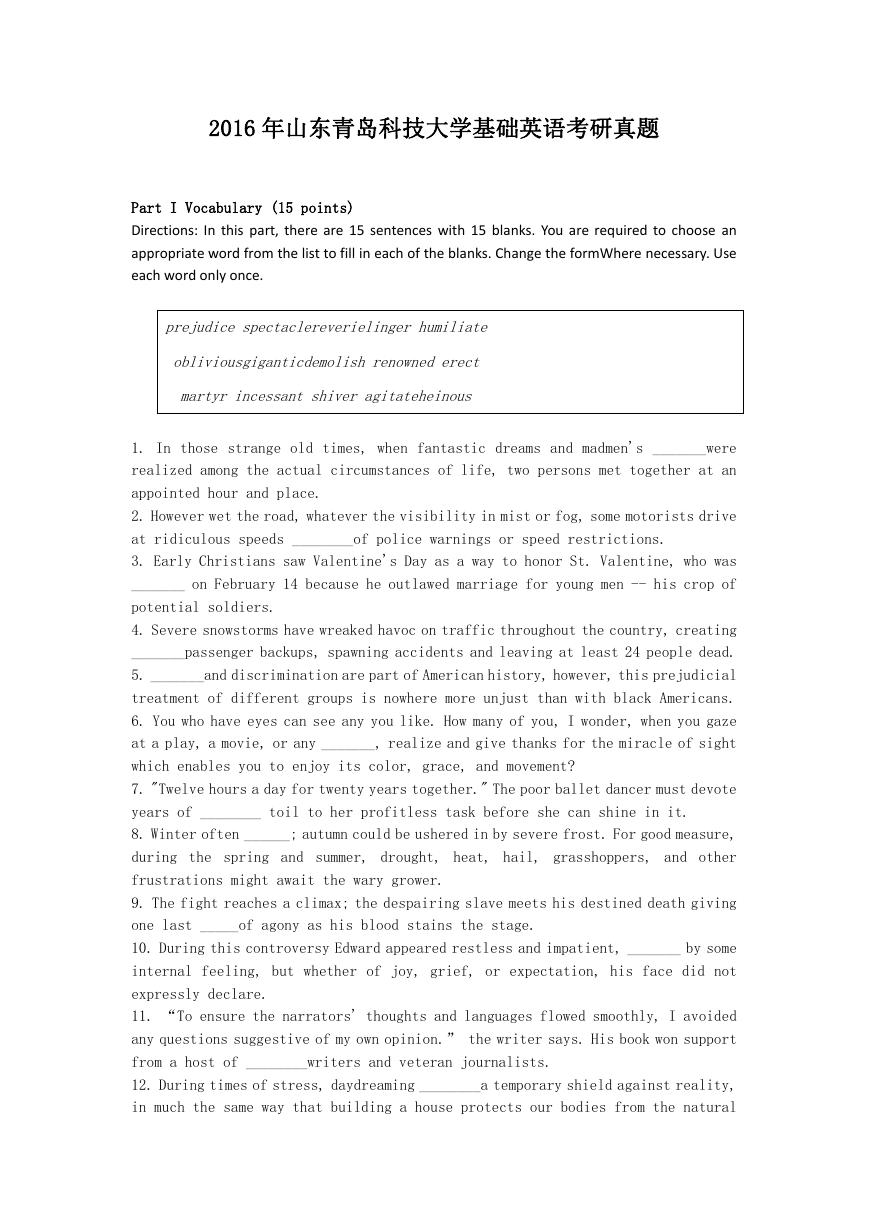
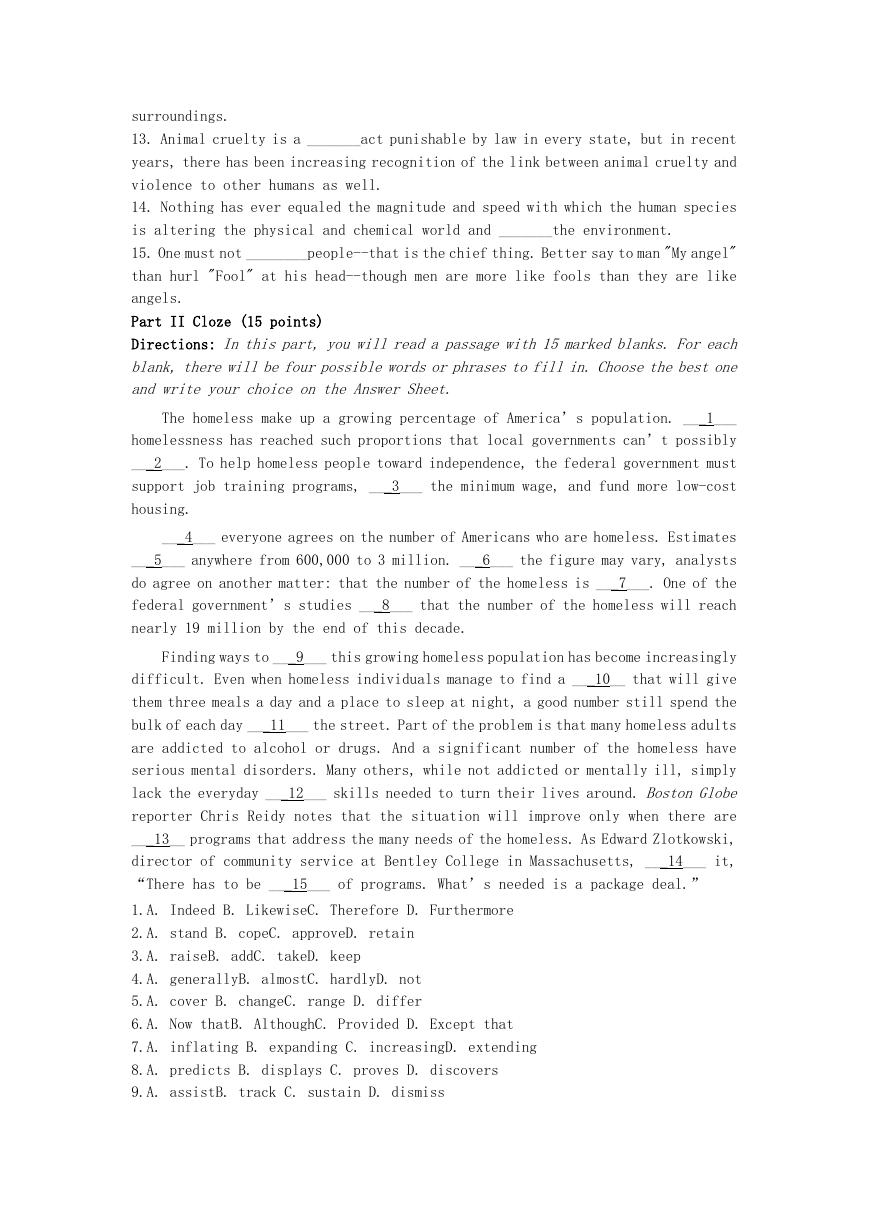
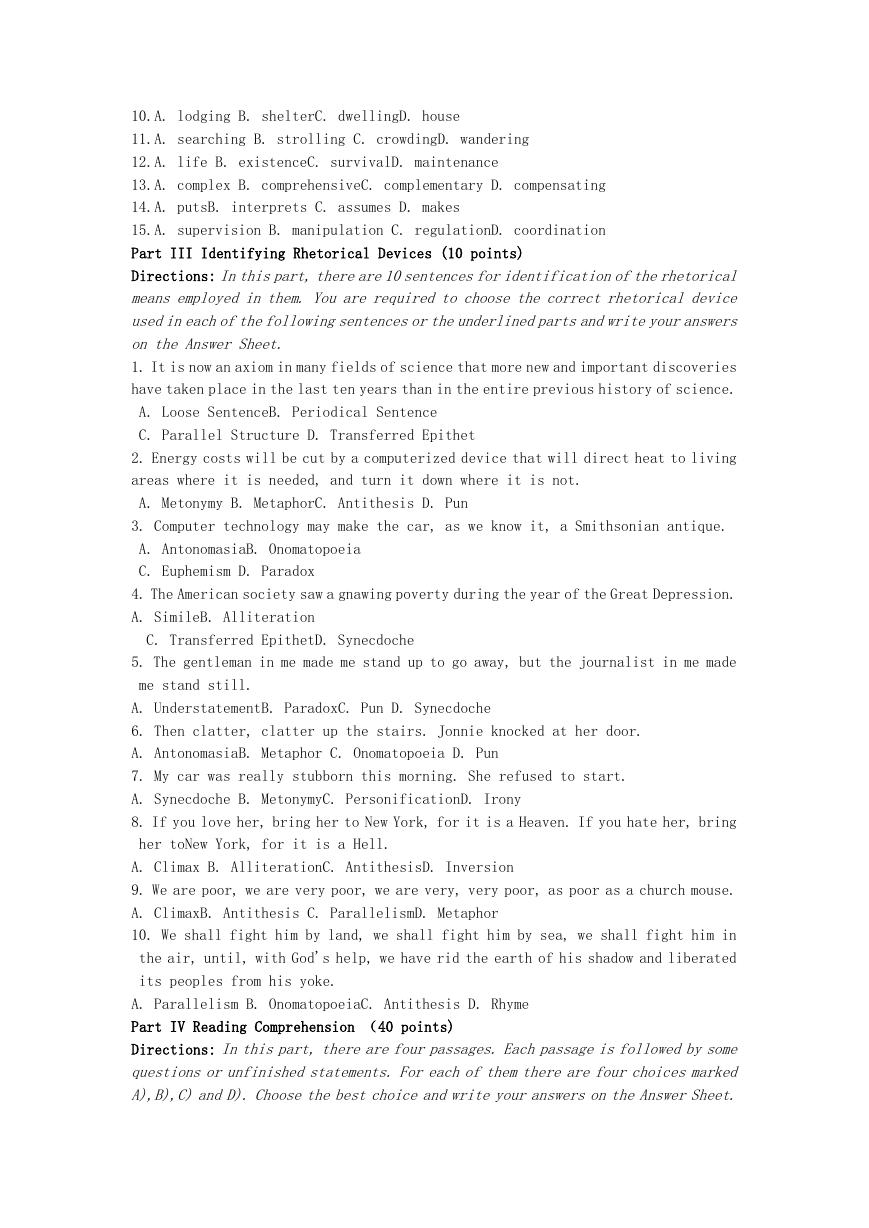
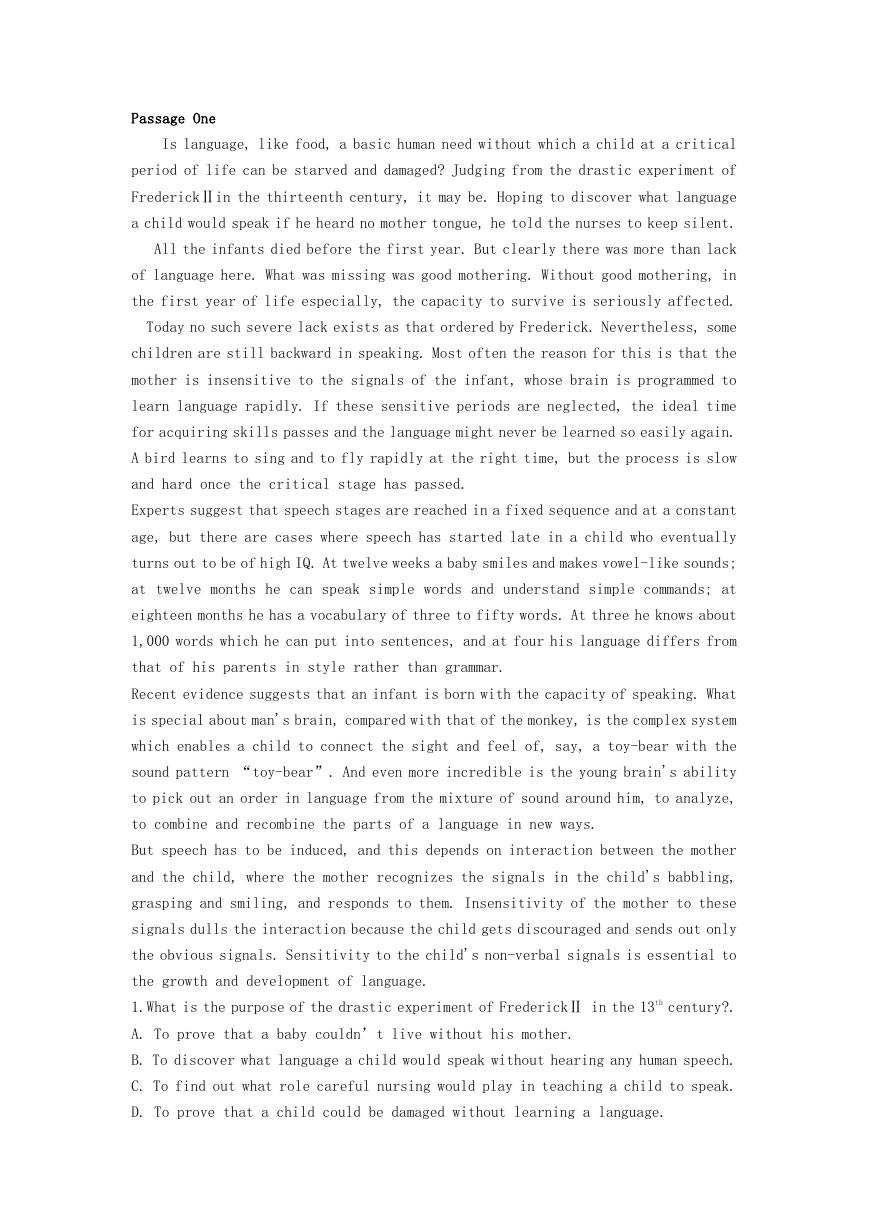
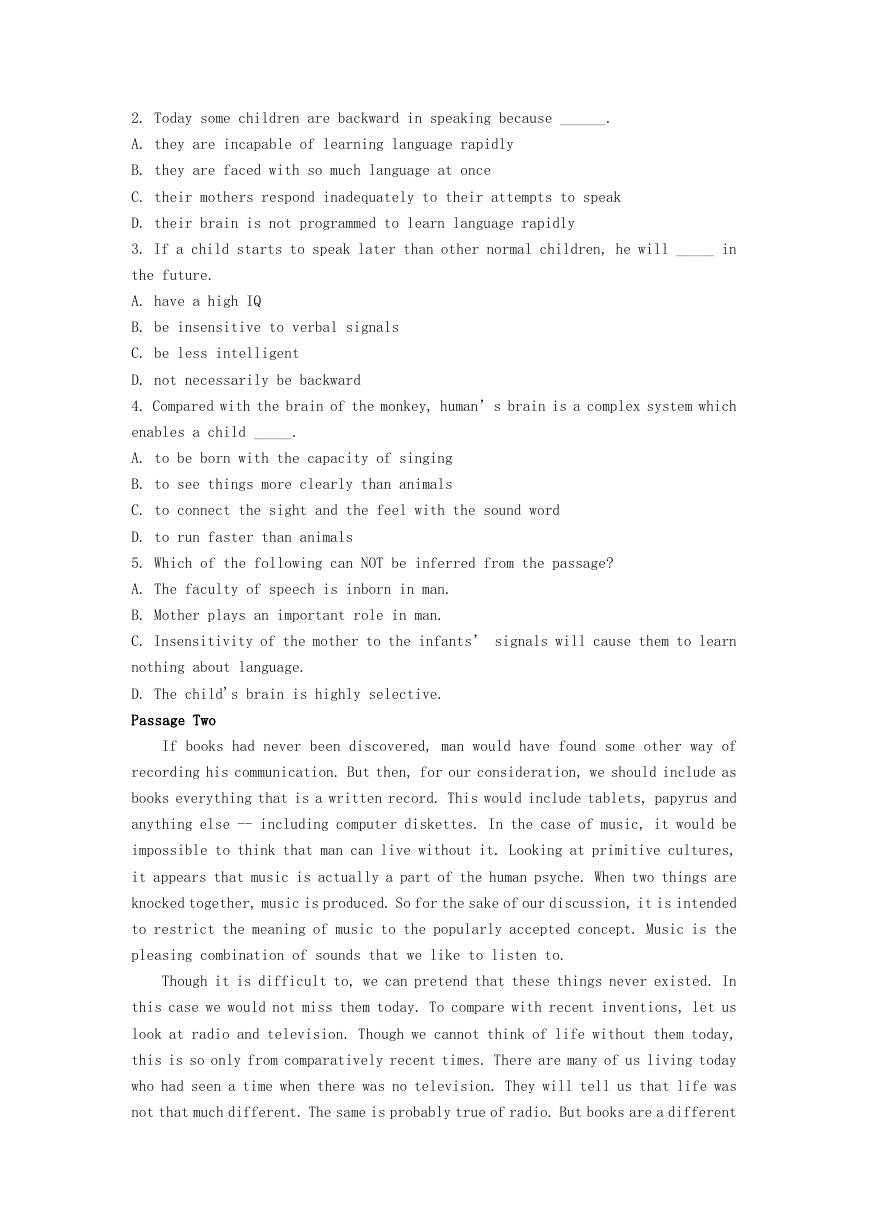
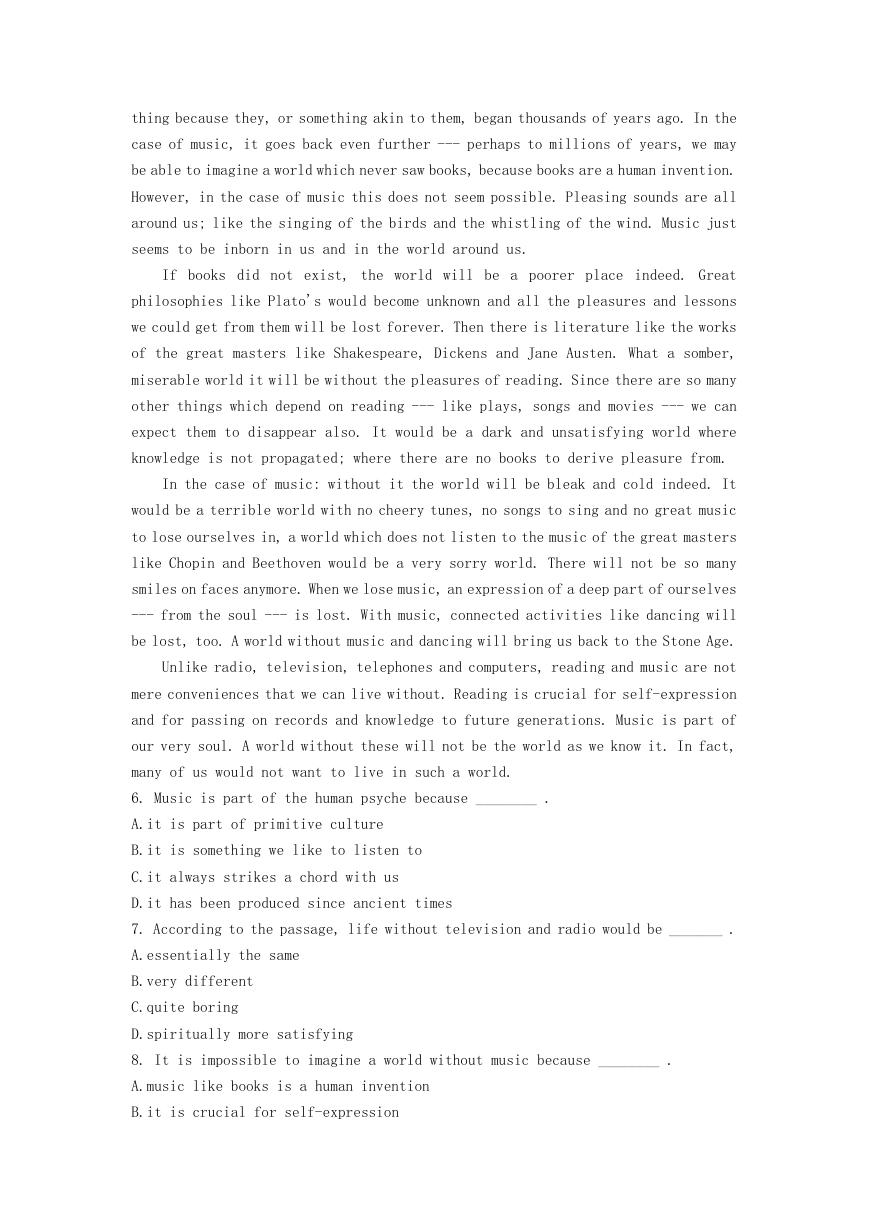
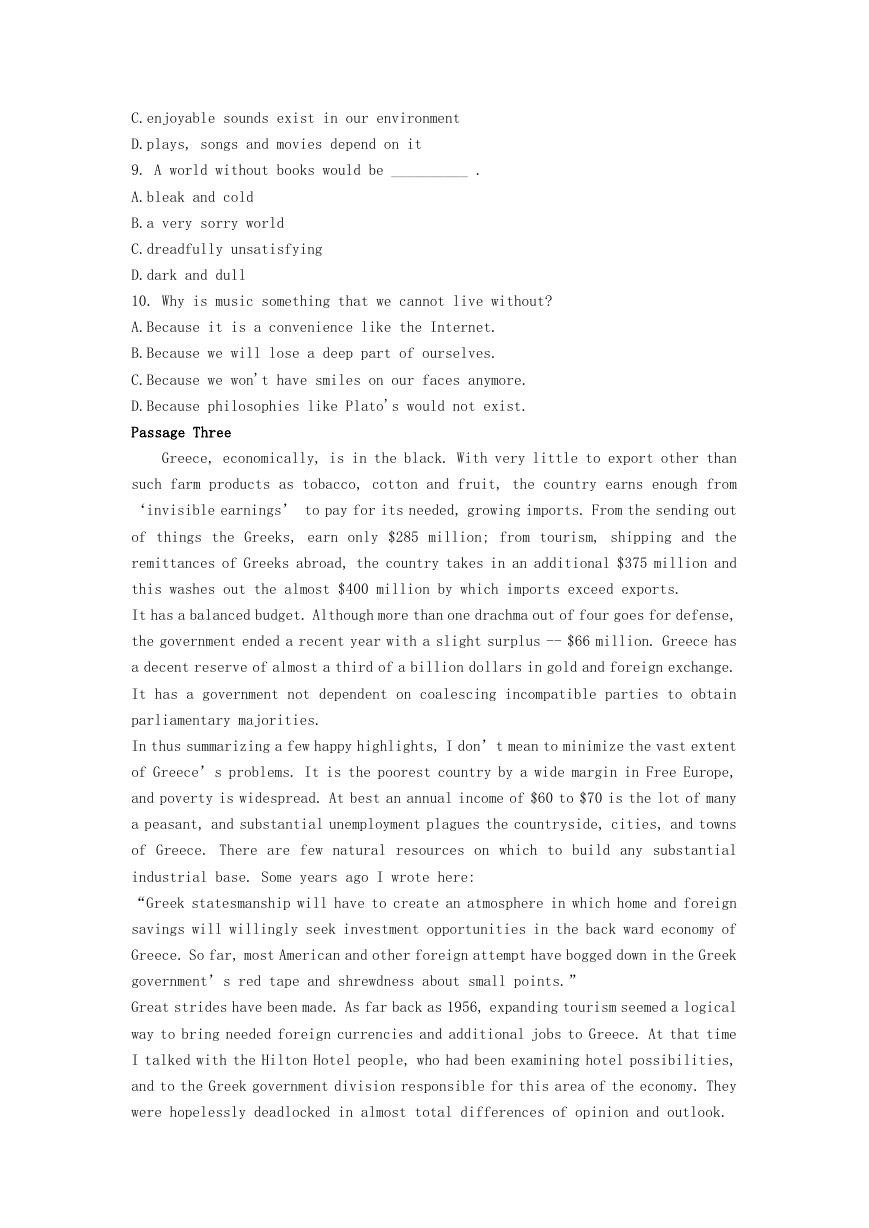
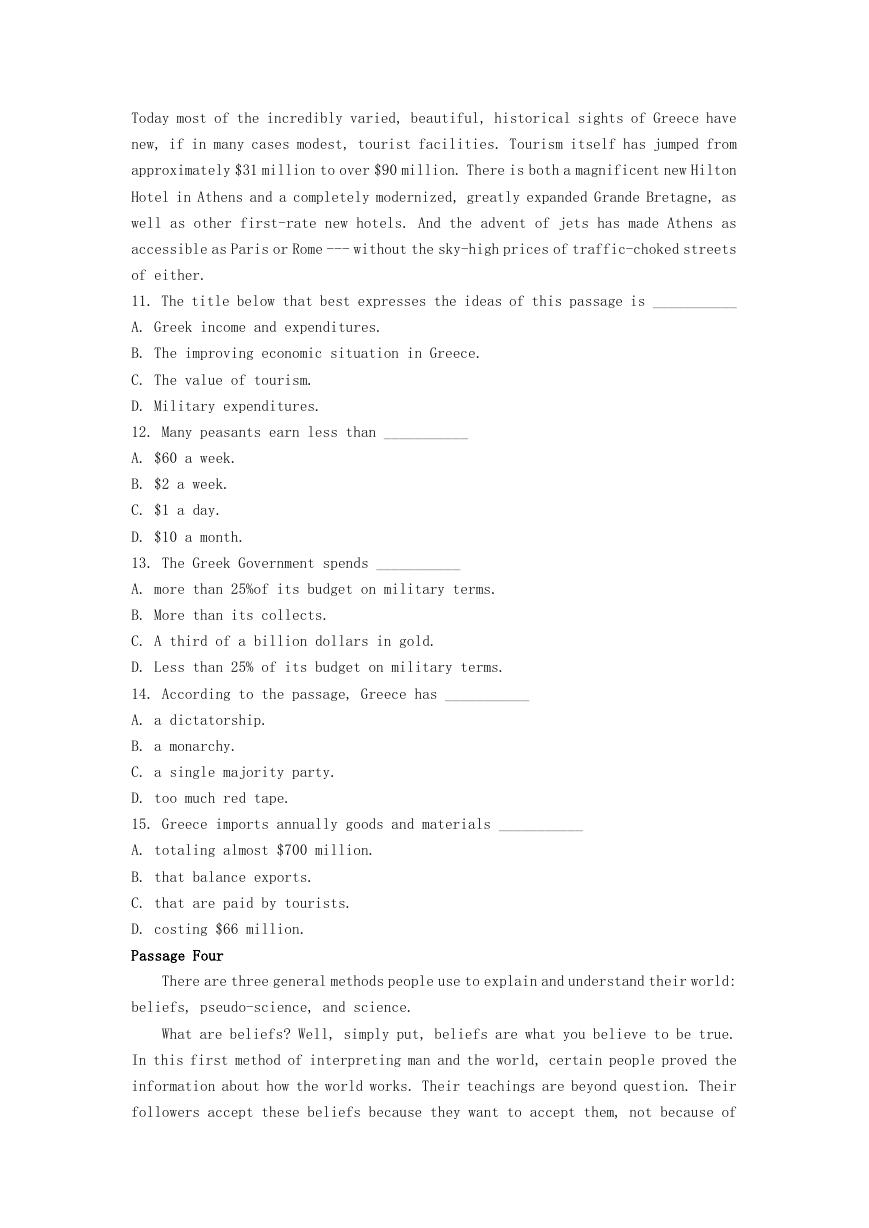








 2023年江西萍乡中考道德与法治真题及答案.doc
2023年江西萍乡中考道德与法治真题及答案.doc 2012年重庆南川中考生物真题及答案.doc
2012年重庆南川中考生物真题及答案.doc 2013年江西师范大学地理学综合及文艺理论基础考研真题.doc
2013年江西师范大学地理学综合及文艺理论基础考研真题.doc 2020年四川甘孜小升初语文真题及答案I卷.doc
2020年四川甘孜小升初语文真题及答案I卷.doc 2020年注册岩土工程师专业基础考试真题及答案.doc
2020年注册岩土工程师专业基础考试真题及答案.doc 2023-2024学年福建省厦门市九年级上学期数学月考试题及答案.doc
2023-2024学年福建省厦门市九年级上学期数学月考试题及答案.doc 2021-2022学年辽宁省沈阳市大东区九年级上学期语文期末试题及答案.doc
2021-2022学年辽宁省沈阳市大东区九年级上学期语文期末试题及答案.doc 2022-2023学年北京东城区初三第一学期物理期末试卷及答案.doc
2022-2023学年北京东城区初三第一学期物理期末试卷及答案.doc 2018上半年江西教师资格初中地理学科知识与教学能力真题及答案.doc
2018上半年江西教师资格初中地理学科知识与教学能力真题及答案.doc 2012年河北国家公务员申论考试真题及答案-省级.doc
2012年河北国家公务员申论考试真题及答案-省级.doc 2020-2021学年江苏省扬州市江都区邵樊片九年级上学期数学第一次质量检测试题及答案.doc
2020-2021学年江苏省扬州市江都区邵樊片九年级上学期数学第一次质量检测试题及答案.doc 2022下半年黑龙江教师资格证中学综合素质真题及答案.doc
2022下半年黑龙江教师资格证中学综合素质真题及答案.doc